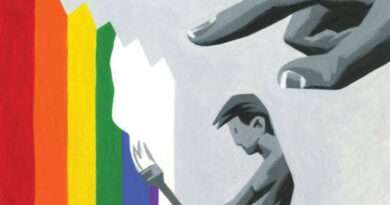Nuances of Asexuality in a Sexually Restrictive Culture Like India
Discussions about sex and sexuality are shunned away from both the public and private spheres in India, which negatively affects an individual’s understanding of their sexual identity. Asexuality, like any other ‘alternate’ sexuality, falls victim to misperception and is often equated with celibacy, which reduces the identity to a choice rather than a natural orientation. The lack of awareness, coupled with an allonormative culture, leads to a lot of issues for asexual individuals in India.
What is Asexuality, and How is it related to the LGBTQ+ community?
Photo of Asexual Flag by Katie Rainbow 🏳️🌈
Asexuality is a sexual orientation in which an individual feels little to no sexual attraction. Like any other sexuality, asexuality is also a spectrum with different identities, such as demisexuality, grey sexuality, etc., falling under it. Asexuals’ relationship to sex differs across individuals; some may be repulsed by sex, others might be neutral towards it, and some might even enjoy sex. Asexual individuals can also feel romantic attraction and may wish to pursue romantic relationships since romantic attraction is different from sexual attraction. Asexuality is unrelated to sexual libido, and asexual individuals can have a high libido and engage in masturbation or sex, depending on their comfort and desire.
Asexuality is a part of the LGBTQ+ community, and one can identify as gay, lesbian, bisexual, trans, etc., while also being asexual. Individuals who are romantically attracted to the opposite sex can also identify as asexual and fall under the label of heteroromantic. Asexuality is considered a marginalised identity even within the LGBTQ+ community since the majority of discussions and representation revolve around relationships that are inherently sexual in nature. Due to this, asexual individuals often feel alienated since they have trouble fitting into the allonormative structures of society, such as sexual relationships, marriage, and procreation. Moreover, the belief that everyone must experience sexual attraction and engage in sexual activity pathologises asexual individuals and labels them as ‘diseased’, ‘impotent’, or ‘broken’ people who need to be ‘fixed’.
Cultural Views on Relationships, Sex, and Marriage in India
Asexual individuals are often subjected to discriminatory such remarks as a result of aphobia
Sexuality is highly policed in India, and sexual relations prior to marriage are looked down upon, due to which asexual individuals find it challenging to come to terms with their identity since the culture propagates the idea that one must only feel sexual attraction towards their husband/wife after marriage. This idea can delay the realisation and acceptance of their identity, causing them years of confusion and isolation. Indian culture also enforces the idea that one must have sex after marriage, which can make it challenging for asexual individuals who might be repulsed by sex or feel little desire to engage in sexual activity. They might be forced to consent and/or subjected to ‘corrective’ rape to make them conform to the allonormative idea of compulsory sexuality. Moreover, the burden of procreation might also hang heavy on their heads, causing them to engage in sex, even if it makes them uncomfortable, in order to conform to societal expectations of bearing a child for the family.
Another practice that is harmful to asexual individuals is arranged marriage, wherein the partner is chosen by parents based on caste, class, religion, education, social standing, and horoscope. In such cases, asexuals lose their agency to choose a partner who understands and accepts their identity, causing them to be married to an allosexual individual who has little knowledge or understanding about asexuality. This can not only cause marital disputes but can also further discourage asexual individuals from pursuing relationships even after the marriage is over. Moreover, Indian culture also views marriage as a rite of passage and does not recognise platonic relationships as valid. Everyone is forced to ‘settle down’ once they reach a particular age, and this ‘settling down’ usually involves a heterosexual arranged marriage. Such socio-cultural beliefs and practices further hinder the freedom of asexual individuals who do not wish to get married and want to spend their lives with platonic partners instead.
Acceptance of Asexuality
Asexuality is not widely accepted in society, due to which asexual individuals find it difficult to navigate their identity and self-acceptance. The false notion that asexuals are sexless, prudish individuals hinders their possibility of finding love and companionship in romantic relationships. Moreover, the idea that sex is central to all relationships and is the epitome of affection is also harmful and aphobic since other non-sexual means of affection can be just as pleasurable. Media representation also plays a major role in propagating aphobia since everything from advertisements to movies is marketed using sexual images, references, or innuendos. Lacking sexual desire, thus, goes against capitalistic modes of thinking, which is why asexuality is viewed as ‘deviant’. Moreover, since asexual relationships, such as Queer Platonic Relationships (QPR), go beyond the norms of an exclusive partnership between two monogamous allosexual individuals, it is further seen as ‘different’ and, therefore, unacceptable. Recognising that the allonormative understanding of relationships, sex, and marriage are nothing but societal constructs can pave the way for acceptance of asexuality in India since not all relationships or individuals can fit into existing social structures.
Image Sources
–https://www.pexels.com/photo/hands-holding-flag-asexual-symbol-8249723/
–https://upload.wikimedia.org/wikipedia/commons/7/7c/Asexual_Exclusion_1.png



